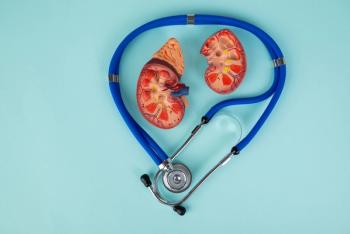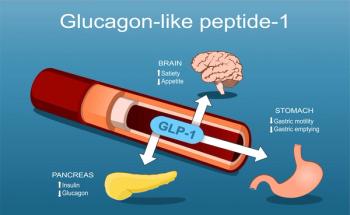
Lipoprotein a (Lp[a]) is a valuable tool for assessing a patient's risk of cardiovascular disease, which can facilitate earlier intervention efforts and reduce health care costs, argued Jeremy Wigginton, MD.

Lipoprotein a (Lp[a]) is a valuable tool for assessing a patient's risk of cardiovascular disease, which can facilitate earlier intervention efforts and reduce health care costs, argued Jeremy Wigginton, MD.

This article reviews underlying barriers to health care access and discusses how a value-based diabetes care model could improve patient outcomes and reduce long-term costs.

Claims data reveal larger hemoglobin A1c decreases in people with type 2 diabetes who use continuous glucose monitoring and semaglutide compared with semaglutide alone.

Astrasentan becomes the first and only endothelin A receptor antagonist to focus on proteinuria reduction in primary immunoglobulin A (IgA) nephropathy.

A real-world analysis showed a link between continuous glucose monitor (CGM) distribution channel and outcomes for patients with diabetes.

Non-Hispanic Black populations face the highest risk of death from chronic kidney disease (CKD)–associated cardiac arrest, a study found.

Tom Belmont, president and CEO, Greater Philadelphia Business Coalition on Health (GPBCH) previews the upcoming employer symposia, which seeks to help employers navigate solutions for the management and prevention of cardiovascular and musculoskeletal disease.

On December 10, 2024, cardiologists, researchers, and value-based care experts gathered in Dallas, Texas, to discuss best practices for implementing advances in cardiology care with a value-based mindset, spanning the care continuum from prevention to treatment.

Discussions at a recent Institute for Value-Based Medicine® event highlighted the interconnected nature of cardio-kidney-metabolic disease and emphasized the need for integrated, patient-centered care.

Cardiologists, primary care physicians, and value-based care leaders convened in Phoenix, Arizona, on November 12, 2024, to share case studies and insights on how to align cardiology with the principles of value-based care, including through the application of digital tools.

Advancing technologies have transformed the detection of heart disease and, in turn, streamlined medical processes and relieved burden on health care systems.

This article describes the reach of a Food-as-Medicine strategy implemented by a regional health care system and its impact on adult participants’ cardiometabolic risk factors.

This study offers new insights to self-insured employers and health plans related to investment in digitally based disease management programs and enrollee engagement.

New diabetes medications are pressuring Medicare Part D financially as they drive up prescription drug costs amid rising rates of type 2 diabetes and obesity.

This multicenter study sheds more light on sex-based differences in aortic stenosis (AS) and argues the benefits of using cardiovascular magnetic resonance (CMR) to assess sex-based risks in AS.

Antoine Keller, MD, founded HeartSense with the purpose of uncovering and addressing the cardiovascular needs of rural, often underserved communities.

Favorable bleeding outcomes related to abelacimab have positioned the medication as a potential game changer in the treatment of atrial fibrillation.

A polypill for preventing cardiovascular disease has the potential to address health inequities and expand health care access for low-income populations.

According to a review of hospital-based cross-sectional studies, almost half the type 2 diabetes population is micronutrient deficient.

Clinically significant reductions in bleeding underscore abelacimab’s strong potential to address an unmet need for patients with atrial fibrillation (AFib).

Patients with diabetes and chronic kidney disease receiving physiologic insulin resensitization had much lower annual costs of care than similar patients not receiving it.

Patient outcomes appeared to be more heavily driven by breast cancer stage than delays in diagnosis, researchers found.

For this review, the authors searched for randomized controlled trials published in MEDLINE, Embase, and Cochrane CENTRAL from inception through October 4, 2024.

In part 2 of our interview, Yehuda Handelsman, MD, discusses how cardiorenalmetabolic (CRM) disease management is advancing with the 2022 Diabetes, Cardiorenal, and Metabolic (DCRM) multispecialty practice recommendations and the updated DCRM 2.0 guidelines.

According to Ian Neeland, MD, strategies like pharmacist-led counseling, patient education programs, and patient assistance initiatives are key to addressing therapeutic inertia.

259 Prospect Plains Rd, Bldg H
Cranbury, NJ 08512
© 2025 MJH Life Sciences®
All rights reserved.
